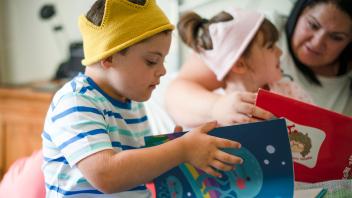The lasting impact of early childhood education has been known for a long, long time. The first three years of a child’s life are crucial to their development socially, emotionally, and educationally.
We’ve gotten the word from pediatricians like T. Berry Brazelton and child development specialists such as Burton White . They provide evidence for what teachers already know.
This was confirmed by a recent piece in the Baltimore Sun . Kindergarten readiness is on the rise in Baltimore, attributed to what has been going on in preK classrooms. There, too, the impact of the Common Core Standards is being felt. Here’s an excerpt from the story:
“In the classroom, that meant swapping Jack and the Beanstalk [the traditional tale] for From Seed to Plant [the book by Gail Gibbons] to teach how plants grow — making way for nonfiction authors on the shelf next to Dr. Seuss and requiring a grocery list for playtime on the kitchen set.
“It really took courage to do this,” said Sonja Santelises, chief academic officer for the city school system. “Our teachers said at the beginning, ‘We’re really freaked out by this nonfiction thing.’ And we had to really convince people that this does not mean that we have 3- and 4-year-olds sitting in chairs scribing or tracing numbers all day. But what it did mean was that we were not going to be afraid of this content.”
Why must books that engage young children be either/or? It’s not fiction (including picture books) VERSUS informational books. They can be quite complementary.
I wonder, too, why do informational books for young children get such a bad rap? Some of the most highly engaging, informative books provide lots of visual and textual information; in fact, they are often called “informational picture books.” (I think of books by Lois Ehlert , Steve Jenkins , and Susan Stockdale .)
I hope that all schools (and parents) embrace this chance to use books — the literature of fact and of fiction — to make the early years the start of a lifelong journey of learning.

